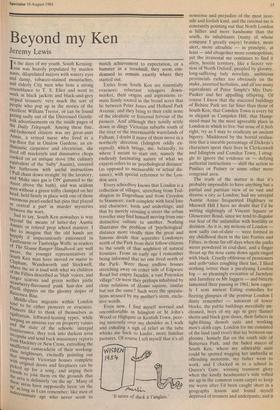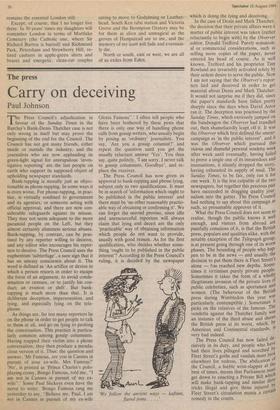Beyond my Ken
Jeremy Lewis
In the days of my youth, South Kensing- ton was heavily populated by maiden aunts, dilapidated majors with watery eyes and damp, tobacco-stained moustaches, and elderly City men who bore a strong resemblance to T. S. Eliot and went to work in black jackets and black-and-grey striped trousers: very much the sort of people who pop up in the stories of the excellent William Trevor, or can be found gazing sadly out of the Distressed Gentle- folk advertisements on the inside pages of the Daily Telegraph. Among these fine, old-fashioned citizens was my great-aunt Annie, a retired nurse who lived in a top-floor flat in Onslow Gardens: an en- thusiastic carpenter and electrician, she lived off mackerels and diminutive chops cooked on an antique stove (the culinary equivalent of the 'baby' Austin), covered her bathroom with useful instructions (Tull chain down straight' by the lavatory, and 'Make sure gas is ON' gummed to the Ascot above the bath), and was seldom seen without a green trilby clamped on her head, held firmly in place with one of those enormous pearl-ended hat-pins that played so central a part in murder mysteries between the wars. Sad to say, South Ken nowadays is way beyond the means of latter-day Auntie Armies or retired prep school masters. I like to imagine that the old hands are happily if impecuniously ensconced in Eastbourne or Tunbridge Wells: as readers of The Sloane, Ranger' Handbook I are well aware, the younger representatives of South Ken man have moved en masse to Clapham, Wandsworth and Stockwell, where the air is loud with what we children of the Fifties described as 'blah' voices, and Jaeger scarves and green wellies jostle strwberry-flavoured punk hair-dos and _irelli slippers on the gloomy slopes of Battersea Rise. Middle-class migrants within London tend to be either pioneers or evacuees. Pioneers like to think of themselves as egalitarian, leftward-leaning types, while and an anxious eye on property values 4nd the state of the schools: intrepid frontiersmen, they trek into darkest terra incognita and send back missionary reports from Hackney or New Cross, extrolling the cLaffeeted camaraderie of their working- ti'lass neighbours, excitedly pointing out 4t , unspoilt Victorian houses complete pi or doors and fireplaces can be fri Ked up for a song, and urging their the adsto join them on the grounds that ,knesarea is definitely 'on the up'. Many of e areas have supposedly been 'on the indeterminate as long as I can remember: like men of
age who never seem to match achievement to expectation, or a hamster in a treadmill, they seem, con- demned to remain exactly where they started out.
Exiles from South Ken are essentially evacuees: reluctant voyagers down- market, their origins and aspirations re- main firmly rooted in the broad acres that lie between Peter Jones and Holland Park Avenue, and they bring to their exile none of the idealistic or fraternal fervour of the pioneer. And although they noisily settle down in dingy Victorian suburbs south of the river or the interminable wastelands of Fulham, I doubt if many of them move in a northerly direction (Islington oddly ex- cepted): which brings, me, belatedly, to where I meant to start out, namely the endlessly fascinating nature of what we experts refers to as 'psychological distance' (as opposed to measurable or actual dis- tance), with special reference to the Lon- don area.
Every schoolboy knows that London is a collection of villages, stretching from Ted- dington to Dagenham and from Croydon to Stanmore, each complete with local lore and character, lords and underlings; and that by merely crossing a street the urban traveller may find himself moving from one distinctive culture to another. Nothing illustrates the problem of 'psychological' distance more vividly than the great and famous divide that separates Londoners north of the Park from their follow-citizens to the south of that mightiest of natural frontiers. From an early age I remember being informed that no one lived north of the Park. Were those endless houses stretching away on either side of Edgware Road but empty facades, a vast Potemkin village? Or were they perhaps inhabited by close relations of Homo sapiens, 'similar but not the same? Such were the specula- tions aroused by my mother's stern, exclu- sive words.
Even now, I find myself worried and uncomfortable in Islington or St John's Wood or Highgate or Kentish Town, peer- ing anxiously over my shoulder as I walk and exhaling a sigh of relief as the tube whisks me back to kinder, more familiar pastures. Of course I tell myself that it's all 'It tastes of duck a I'anglais.' nonsense and prejudice of the most juve- nile and foolish kind, and the rational me is constantly pointing out that North London is hillier and more handsome than the south, its inhabitants (many of whose company I greatly enjoy) brainier, more alert, more altruistic — in principle, at least — and altogether more cosmopolitan; yet the irrational me continues to find it alien, hostile territory, like a fiercer ver- sion of North Oxford, peopled by gloomy, long-suffering lady novelists, ambitious provincials rather too obviously on the make, assorted herbalists, and all too many equivalents of Peter Simple's Mrs Dutt- Pauker and her appalling offspring. Of course I know that the stuccoed buildings of Belsize Park are far finer than those of South Ken, that Camden Town is every bit as elegant as Campden Hill, that Hamp- stead must be the most agreeable place in London in which to live: but none of it feels right, try as I may to eradicate an ancient bigotry. Maddened by the horrid realisa- tion that a sizeable percentage of Dickens's characters spent their lives in Clerkenwell and Islington and Camden Town, I strug- gle to ignore the evidence or — defying authorial instructions — shift the action to Pimlico or Putney or some other more congenial area.
The truth of the matter is that it's probably impossible to have anything but a partial and partisan view of so vast and diverse a city as London; had my intrepid Auntie Annie frequented Highbury or Muswell Hill I have no doubt that I'd be writing slightingly of Vincent Square or Gloucester Road, since we tend to disguise our fear of the unfamiliar with hostility or derision. As it is, my notions of London now sadly out-of-date — were formed in my childhood there in the late Forties and Fifties, in those far-off days when the parks weres powdered in coal-dust, and a finger thrust up the nose came down again ringed with black. Cruelly oblivious of pensioners and asthmatics coughing their last, I liked nothing better than a paralysing London fog — so pleasingly evocative of Jarndyce and Jarndyce or. Mr Jaggers — and bitterly lamented their passing in 1961; how eager- ly I scan ancient Ealing comedies for fleeting glimpses of the postwar London I dimly remember — innocent of tower blocks, the public buildings mercifully un- cleaned, boys of my age in grey flannel shorts and black gym shoes, their fathers in tight-fitting demob suits and working men's cloth caps. London for me consisted of the land (and river) that lay between our gloomy, homely flat on the south side of Battersea Park. and the faded stucco of South Ken, where my admirable aunt could be spotted wagging her umbrella at offending motorists, my father went to work, and I clocked in to a school in Queen's Gate, winning transient glory when the kindly headmaster's wife rolled me up in the common room carpet to keep me warm after I'd been caught short in a geography lesson and found myself deprived of trousers and underpants; and it remains the essential London still.
Except, of course, that I no longer live there. In 30 years' times my daughters will remember London in terms of Mortlake Cemetery (the Catholic one, where Sir Richard Burton is buried) and Richmond Park, Petersham and Strawberry Hill, re- tired cashiers in apple-green shirts and braces and energetic, clean-cut couples saving to move to Godalming or Leather- head. South Ken tube station and Victoria Grove and the Brompton Oratory may be for them as alien and unmagical as the groves of Hampstead are to me, and the memory of my aunt will fade and eventual- ly die.
North or south, east or west, we are all of us exiles from Eden.







































 Previous page
Previous page